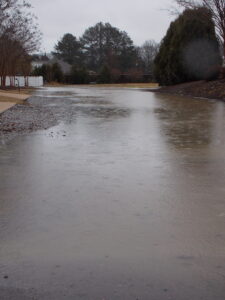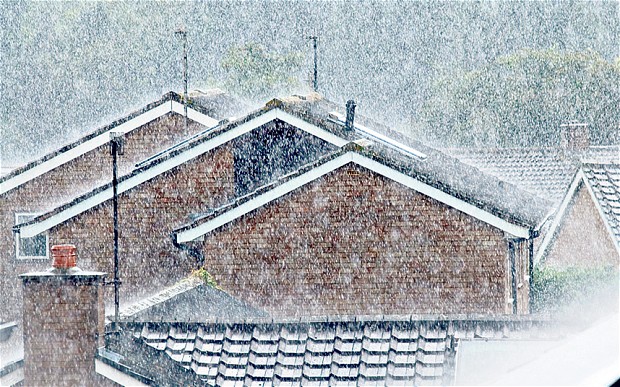Headlines
Curb Appeal: Why You Should Shop for a Home in the Rain
Two things I learned from my family of real estate professionals: Try not to build your home at the bottom of a hill and shop for a home or lot during a rainy weekend. These two statements of wisdom are related in that they teach you to be sure your home or property is not likely to collect water inside during a heavy rain.
Should you find your dream home in a flood zone and want to take the risk, be sure to purchase flood insurance for the house. This policy is separate from the homeowner’s policy and is available through FEMA and private insurance companies. Most mortgage companies require flood insurance if you are in a flood zone. It is generally affordable and the peace of mind from having flood insurance is worth the additional cost. Flooding and having rain leaking into your home during a torrential, rainy weekend can both cause substantial damage.
A flooding event is something a seller needs to disclose. If it is not on the disclosure statement and you have suspicions you need to speak up and ask questions including, “does water puddle outside the doors?” A house I once rented nearly flooded at the front door after each heavy rain. The water rose up to the door’s threshold but never actually topped it and came inside. It was nerve wracking knowing my living room could flood and I was certainly glad I was renting rather than being the homeowner. A fixable yet potentially expensive problem, this could happen to a home you are considering so be cautious and pay attention to these types of details.
 House shopping on a very rainy day or weekend will give you a good idea of whether or not you want to consider a particular home for sale. Sit in your car outside the home and look for puddles in the yard. If the yard slopes toward the home, watch how the water drains away…or not.
House shopping on a very rainy day or weekend will give you a good idea of whether or not you want to consider a particular home for sale. Sit in your car outside the home and look for puddles in the yard. If the yard slopes toward the home, watch how the water drains away…or not.
If you do buy sloping property, which is abundant in Lafayette County, be sure to build your home in a spot that will not flood. The bottom of the property is not the ideal place since all water drains downward. But if that is the best spot on the particular property to build, be sure the area surrounding the slab is graded so water rolls away from the house.
Here are two examples of grading around your home. In a home my husband and I had built for us on flat land along the coast, the builder raised the ground where the house would sit buy 4 feet with fill dirt. We stayed dry; the hurricane rains drained away from the house. A friend of ours was not so lucky and found that after the first heavy rain in her new home, she had to pay to have the flat yard re-graded. Further, a new drainage system had to be installed around the back of the house to keep water from pouring into her back doors. This was not something she anticipated when she purchased the house and cost several thousand dollars. So, be wise about the yard, how high the slab sits and where the rain may be draining.
A poorly graded yard can also affect your curb appeal. Granted, a downward slope doesn’t always mean your home will leak around the doors when it rains, but if the ground pools badly during rain, your grass and landscaping may suffer. If this is happening, consult a professional for advice. Most landscaping companies will meet with you and give you a free consultation with an estimate for their services. Sometimes all you will need to do is simply raise your garden beds and the landscaping that extends into the yard or surrounds a grove of trees. A raised garden or grading around a grove of trees can help keep water from pooling and push it along, away from your front door and sidewalk. Be sure to consult a landscaper or garden shop before adding soil around established trees. This could harm them.
Another way to improve curb appeal is to install rain gutters. Bushes that sit where the rain pours off the home’s roof can get damaged from the trauma of rushing water. Gutters and downspouts can focus the water away from your foundation. If gutters are not an option for you, place the bushes farther away from the house and add gravel to the flower bed where the water falls to avoid erosion and potential damage to the home’s foundation.
While you are working on landscaping, be sure to add plants that will enhance the look of your house year round. Some bushes bloom with flowers throughout the warm months, some grow berries in the cold months. Each add color and texture. Make your house beautiful.
 Eileen Saunders is a HottyToddy.com contributor who writes on curb appeal and gardening. A certified Junior Master Gardener Instructor and Master Environmental Educator, Eileen is also a realtor in the Oxford office of Tommy Morgan Inc., Realtors. You can contact Eileen at epsaunders20@gmail.com or call her at 662-404-0816. For more home tips, follow her Facebook page.
Eileen Saunders is a HottyToddy.com contributor who writes on curb appeal and gardening. A certified Junior Master Gardener Instructor and Master Environmental Educator, Eileen is also a realtor in the Oxford office of Tommy Morgan Inc., Realtors. You can contact Eileen at epsaunders20@gmail.com or call her at 662-404-0816. For more home tips, follow her Facebook page.

















